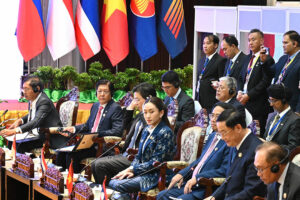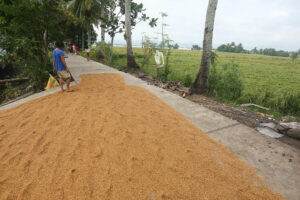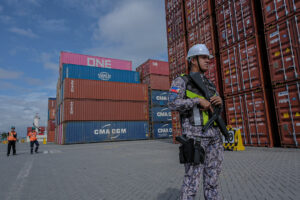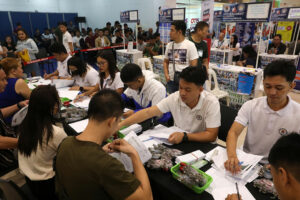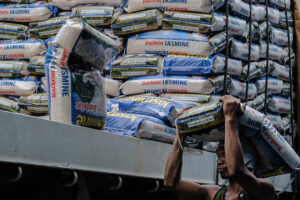LEADERS of the Association of Southeast Asian Nations (ASEAN) on Wednesday discussed progress toward a South China Sea code of conduct and agreed that the United Nations Convention on the Law of the Sea (UNCLOS) should be the bloc’s basis for settling sea disputes, a Thai official said.
Nikorndej Balankura, a spokesman for Thailand’s Foreign Ministry, said the issue of ASEAN unity and prioritizing its centrality was also stressed during a retreat of ASEAN leaders in Laos.
Also on Wednesday, the Philippine presidential palace said President Ferdinand R. Marcos, Jr. was set to join fellow ASEAN leaders for an “interface” with representatives of the ASEAN Business Advisory Council (ABAC) in Vientiane.
The President would reiterate the Philippines’ commitment to working with the private sector in advancing ASEAN’s goals and objectives and call on the council to take a leading role in shaping the regional economy.
Meanwhile, the Philippines and Vietnam said they are exploring more areas of cooperation to boost a strategic partnership that they sealed in 2015 that includes defense and maritime ties.
President Ferdinand R. Marcos, Jr. and Vietnam Prime Minister Pham Minh Chinh issued the statement on the sidelines of the 44th and 45th summits of the ASEAN in Laos.
“We have made a good deal of progress since our very first discussion and some of the engagements between our two countries,” he told the leader of the $409-billion economy, based on a statement from the presidential palace in Manila.
“And I am very happy that we will be able to pursue that. It also gives us the opportunity to explore new areas of cooperation and partnership,” he added.
Mr. Chinh, for his part, reaffirmed Vietnam’s commitment to its strategic partnership with the Philippines.
“I want to reaffirm that we always support the strategic partnership with the Philippines,” he said. “I’m glad to note that the discussions that we began two years ago have been implemented effectively.”
The two countries in November 2015 agreed on their strategic partnership that covers political and economic cooperation, defense and maritime ties, among other things.
Vietnam and the Philippines in January signed a deal to boost cooperation between their coast guards, amid China’s assertiveness in the South China Sea.
The two countries have also entered partnerships in rice trade and the prevention of accidents in the South China Sea, which Beijing claims almost in its entirety.
One of the South China Sea features that has been a source of tension among the three nations is Scarborough Shoal, which lies just 600 kilometers from the Philippine province of Palawan.
A 2016 arbitral ruling that voided China’s claims in the South China Sea said the shoal is a traditional fishing ground for Filipino, Chinese and Vietnamese fishermen. China has controlled the shoal since 2012.
Data from the General Department of Vietnam Customs showed Hanoi posted a $2.41-billion trade surplus with Manila in the first eight months of 2024. Their bilateral trade rose by 21% to $5.7 billion from a year earlier.
Philippines imports from Vietnam hit $4.07 billion during the eight-month period, up 17%, with rice worth $1.71 billion as the top import commodity. Rice was the only Vietnamese export to the Philippines exceeding $1 billion.
The Philippine government in June reduced the tariffs on rice imports to 15% from 35% effective August until 2028, as it seeks to cool food inflation.
Vietnam accounts for 80% of Philippine rice imports, having exported 1.44 million tons of the commodity as of May 23.
Mr. Marcos and Mr. Chinh first discussed the rice deal during their bilateral meeting on the sidelines of the 43rd ASEAN Summit in Jakarta in September last year.
At that time, Mr. Marcos said his country hoped Vietnam would be an important partner in its shift to electric vehicles.
MILITARY BUDGET
Meanwhile, Senator Joseph Victor G. Ejercito pushed funding of at least P100 billion for the Philippine military’s modernization program, citing the need for more missile systems and fighter jets to deter Chinese aggression at sea.
“The acquisition and production of defense equipment takes time, and we really need this since we don’t want to be bullied anymore by China,” he told a news briefing. Mr. Ejercito told a news briefing.
The House of Representatives has approved on final reading next year’s national budget bill, which allots P204.4 billion to the Philippine Army, Air Force and Navy. Lawmakers also allocated P50 billion for modernization efforts of the Armed Forces of the Philippines.
Philippine President Ferdinand R. Marcos, Jr. on Tuesday signed into law a bill requiring the government to pursue a defense posture that relies on local producers.
The US Navy, Marines and their Filipino counterparts on Monday kicked off their two-week joint military exercises in Subic Bay in northern Philippines aimed to boost interoperability between their military forces.
The navy and marine forces will conduct high-intensity drills focusing on anti-submarine, anti-air and anti-surface warfare, along with the use of maritime surveillance aircraft, according to the US Defense Department.
Mr. Ejercito said the government should increase military resources to deal with the precarious situation with Beijing in the South China Sea.
Chinese vessels on Tuesday fired water cannons at two ships of the Bureau of Fisheries and Aquatic Resources (BFAR) delivering supplies for Filipino fishermen at Scarborough Shoal, BFAR said.
“We really need to focus on external defense or the acquisition of multi-role fighters, war vessels and missile systems,” the Senate deputy majority floor leader said. “This is only for deterrence to aggression.”
China claims almost the entire South China Sea, including parts claimed by the Philippines, Brunei, Malaysia, Taiwan and Vietnam.
Portions of the waterway, where $3 trillion worth of trade passes yearly, are believed to be rich in oil and natural gas deposits, as well as fish stocks.
Senators have been pushing the Philippine Foreign Affairs Department to file a resolution with the UN body condemning China’s aggression in the South China Sea.
Manila also eyes raising its dispute with China at the ASEAN once it heads the regional body in 2027.
The ASEAN and China have been in talks as far back as 2002 to craft a code of conduct in the South China Sea.
In 2016, a United Nations-backed tribunal based in the Hague voided China’s claim to more than 80% of the South China Sea for being illegal.
The Philippines has been unable to enforce the ruling and has since filed hundreds of protests over what it calls encroachment and harassment by China’s coast guard and its vast fishing fleet.
“We do not want war, but we are just protecting our territory and what is rightfully ours,” Mr. Ejercito said. — Kyle Aristophere T. Atienza and John Victor D. Ordoñez, with Reuters


